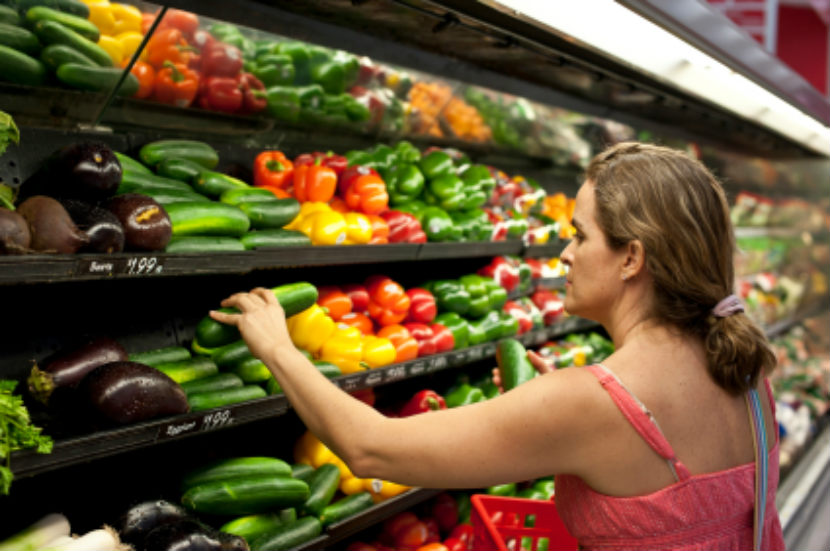
**** Dietitian support during COVID-19****
Storing vegetables the right way will keep them fresh and safe to eat. Some vegetables and fruit need to be stored in the refrigerator, others need to ripen before being placed in the refrigerator, and others are best stored at room temperature or in a cool dry place. Find out more about how your favourite vegetables should be stored.
Bonus! Watch the video How to store vegetables to keep them fresh to see this information in action.
Storing leafy greens to keep them fresh
Leafy greens stay fresh longer if they’re rinsed, wrapped in a paper towel or tea towel, and refrigerated in a container or sealed plastic bag. You can do this with lettuce greens, bok choy, Swiss chard, kale and spinach.
Time saving tip – Washing and storing leafy greens as soon as you bring them home will make them more convenient to eat.
Note: Even if you buy prewashed greens it is a good idea to rinse them again when you get home.
Storing asparagus to keep them fresh
Asparagus should be stored in the fridge. Keep the stalks moist by wrapping them with a damp paper towel or store the stalks upright in a bowl or glass of cold water.
Storing squash and root vegetables to keep them fresh
Squash and root vegetables should be stored in a cool, dark, dry spot outside the fridge like a cupboard or root cellar. You can also store garlic, onions, potatoes, sweet potatoes, yams, pumpkins and rutabaga this way.
Storing tomatoes to keep them fresh
For the best-tasting tomatoes, store them at room temperature away from direct sunlight. This will help them ripen evenly. Once they are ripe they can be placed in the fridge.
Storage times are different for each type of vegetable
The guidelines below are for vegetables at their best quality. They still may be safe to eat after the stated times as long as they are not mouldy or rotten.
|
Vegetable
|
How long?
|
|
Cupboard/cool room temperature
|
|
Potatoes
|
1-2 weeks
(2-3 months in a cool, dark place)
|
|
Tomatoes
|
1-5 days
|
|
Onions
|
1-2 months
|
|
In the fridge
|
|
Asparagus
|
3-4 days
|
|
Beans (green, wax)
|
3-5 days
|
|
Beets
|
2 weeks
|
|
Broccoli
|
3-5 days
|
|
Brussels sprouts
|
3-5 days
|
|
Cabbage
|
1 week
|
|
Carrots
|
3-4 weeks
|
|
Cauliflower
|
1 week
|
|
Celery
|
1-2 weeks
|
|
Corn
|
1-2 days
|
|
Cucumbers
|
1 week
|
|
Green onions
|
7-10 days
|
|
Lettuce
|
1 week
|
|
Mushrooms
|
4-7 days
|
|
Parsnips
|
3-4 weeks
|
|
Peas in the pod
|
3-5 days
|
|
Peppers (green, red)
|
1-2 weeks
|
|
Potatoes (new)
|
1 week
|
|
Rutabaga
|
2-3 weeks
|
|
Spinach
|
3-5 days
|
|
Sprouts
|
3-5 days
|
|
Squash (summer) e.g. zucchini, patty pan
|
4-5 days
|
Most vegetables, like carrots, potatoes, broccoli, cabbage and celery should be stored in a plastic bag or container in the crisper of your fridge. Mushrooms are best stored in a paper bag. Vegetables should be stored in a different part of the fridge than fruit. This will prevent them from ripening too fast.
How long can I store canned vegetables?
Canned vegetables can be kept for 1-2 years. Label the can with the date to help you keep track of how long it has been in your cupboard.
Some canned vegetables will have a “use by” date. This is how long the food will be at its best quality as decided by the manufacturer. Cans that are not damaged and have been stored properly will still be safe to eat after this date.
Freeze your vegetables if you can’t eat them right away
-
Freezing vegetables at home is a fast and easy way to preserve nutrients and enjoy the taste of summer vegetables all year long.
-
Most vegetables need to be blanched before they are frozen. This means that you should boil the whole or cut up pieces of the vegetable for 1-2 minutes and then immediately place in ice cold water to stop the cooking process. This will keep your vegetables from getting freezer burn. Frozen vegetables will be fine for up to one year.
-
Freezing is not recommended for artichokes, Belgian endive, eggplant, lettuce greens, potatoes (other than mashed), radishes, sprouts and sweet potatoes.
Watch the video How to store vegetables to keep them fresh to see this information in action.
You may also be interested in:
Video: How to store vegetables to keep them fresh
Video: How to store fruit to keep them fresh
Vegetable and fruit food safety facts
Last Update – June 10, 2020